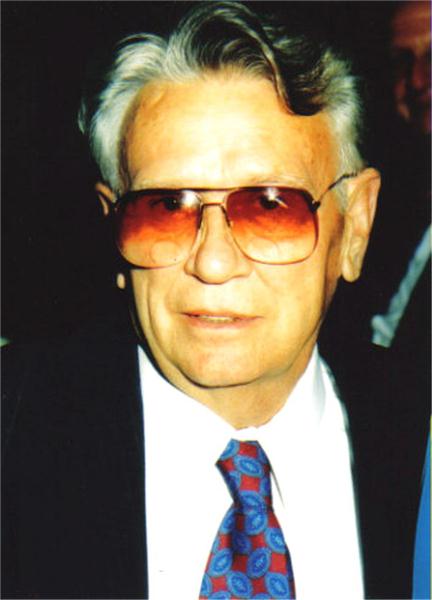
Bill Gothard, WWII vet and former owner of Bill Gothard's Auto Parts in Sale Creek.
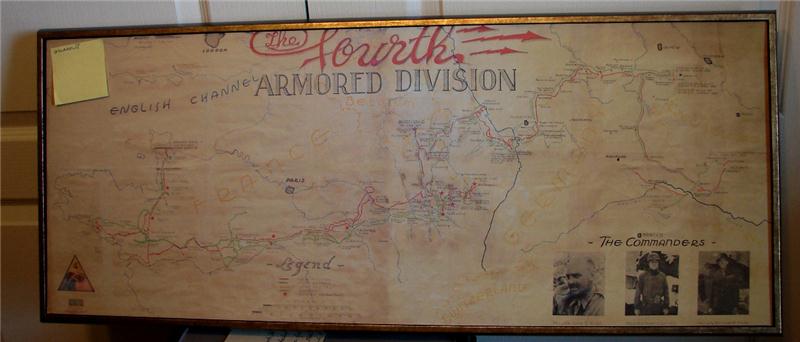
A map of D-Day, June 6, 1944
photo by Jen Jeffrey
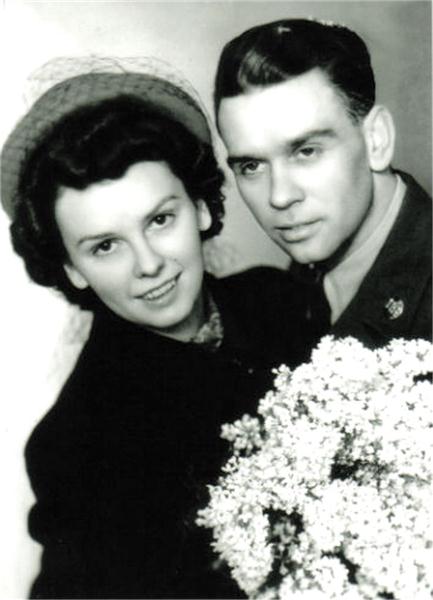
Bill fell for a German lady named Elfie and made her his wife.
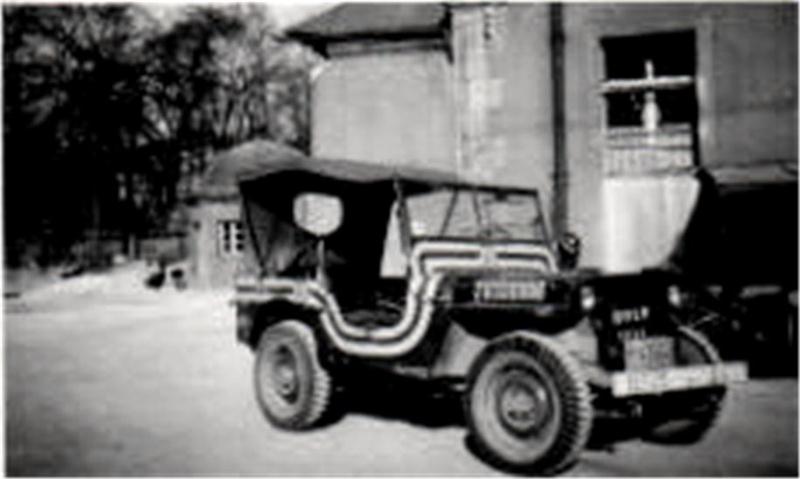
Bill had a 'Major' fallout over a Jeep he wanted to buy.
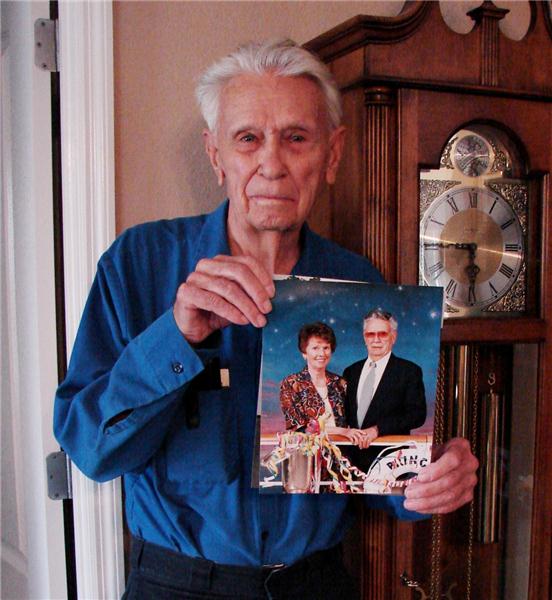
Bill misses his wife Elfie, who passed in 2009.
photo by Jen Jeffrey
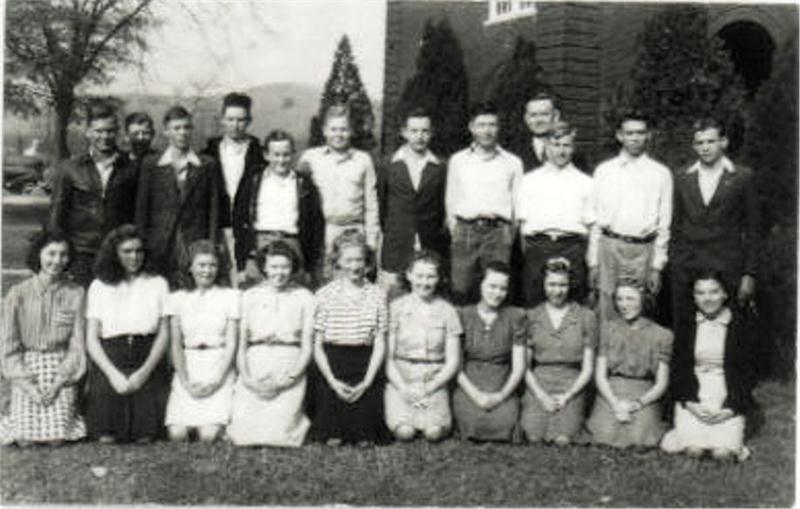
Bill, second from upper right, liked Mr. and Mrs. Bond while attending Sale Creek School.
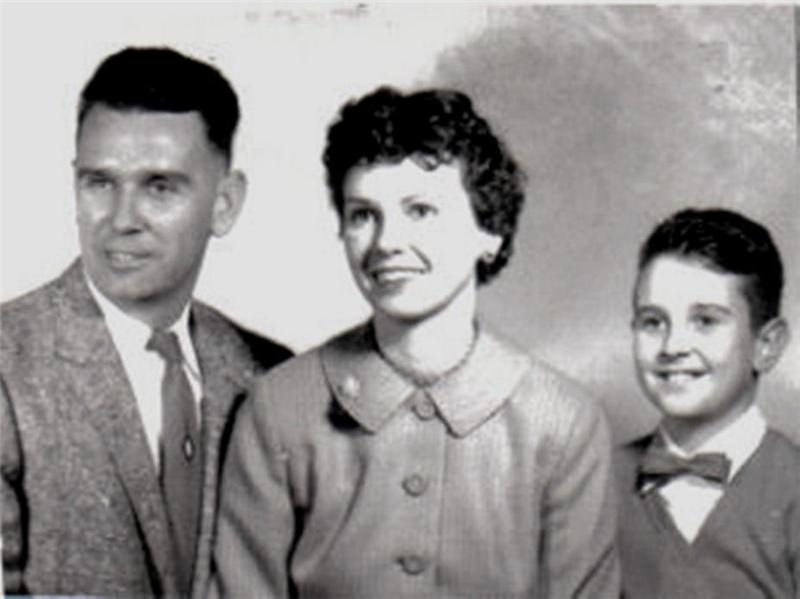
Bill, with wife, Elfie and son, Mike.
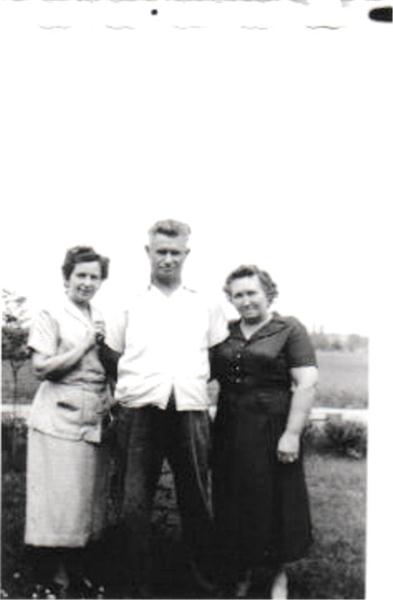
Bill's parents, George and Beulah Gothard, with his mother in-law, Hannah on the left.
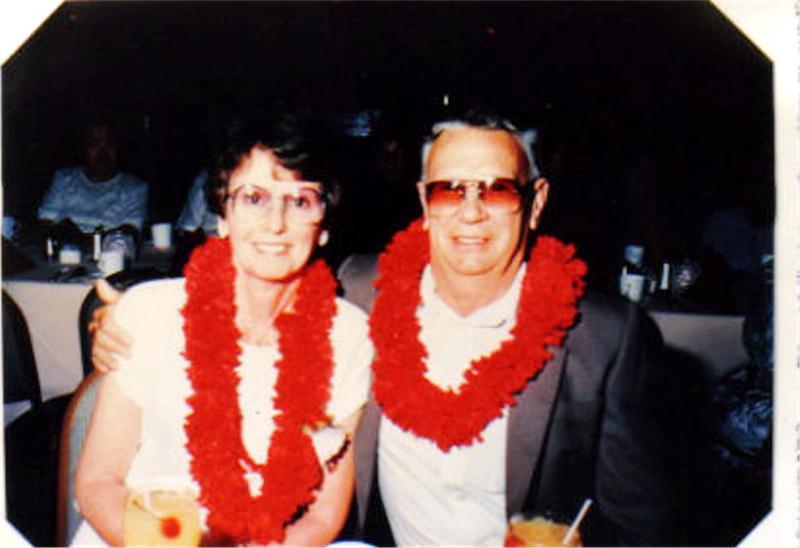
Elfie and Bill take a cruise to Hawaii.
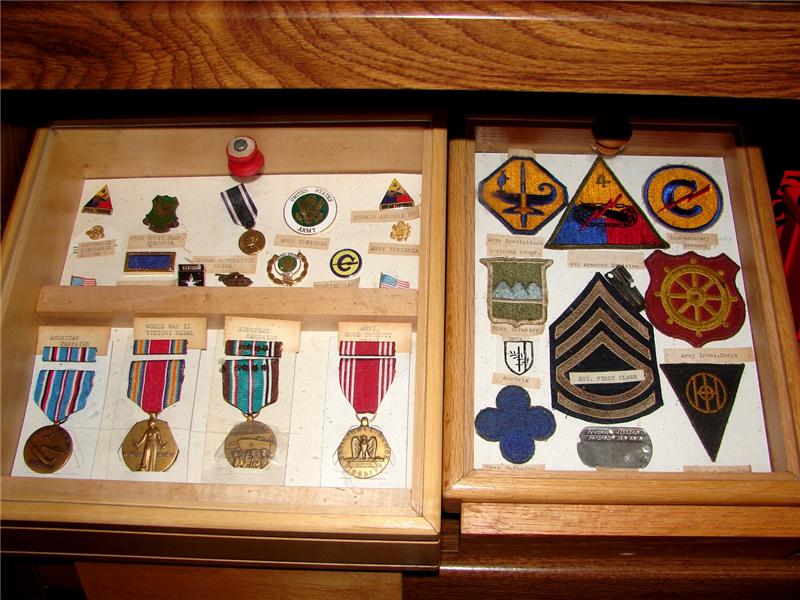
Just a few of the medals and honors Bill received during his service.
photo by Jen Jeffrey
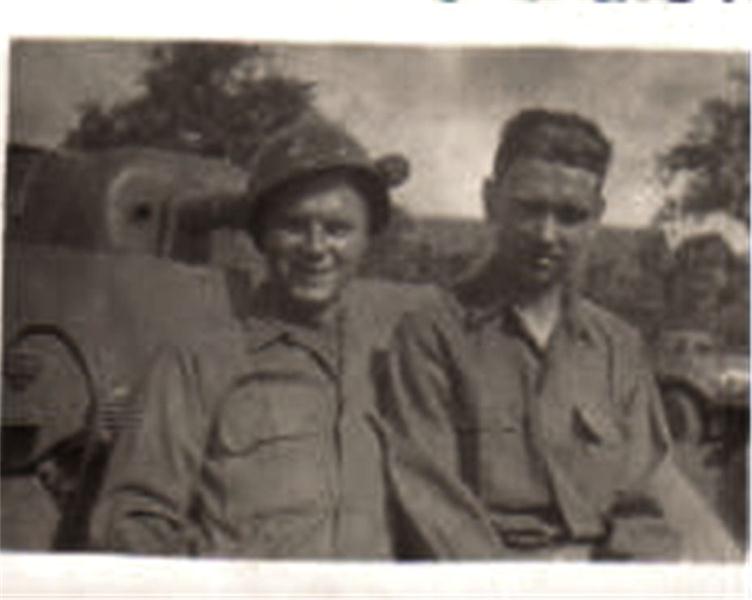
Robert Bittner and Bill sometime before an explosion blackened Bittner's face sending him diving into the snow.
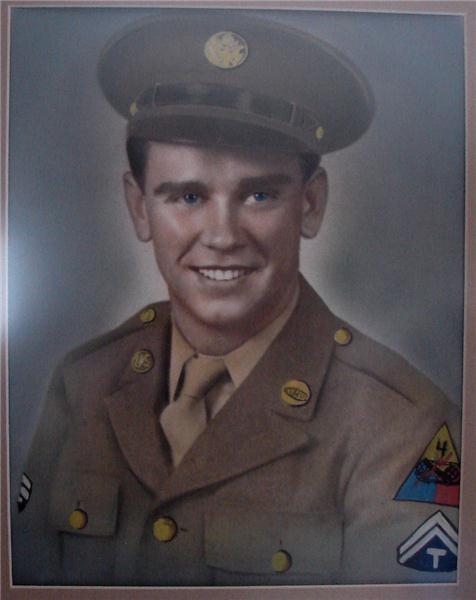
Sgt. 1st Class Bill Gothard
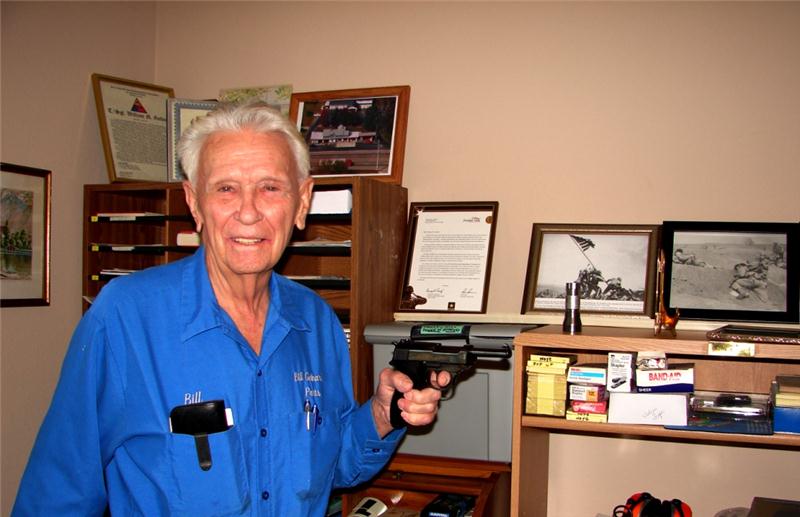
Standing in front of much history and holding up a gun from the war.
photo by Jen Jeffrey
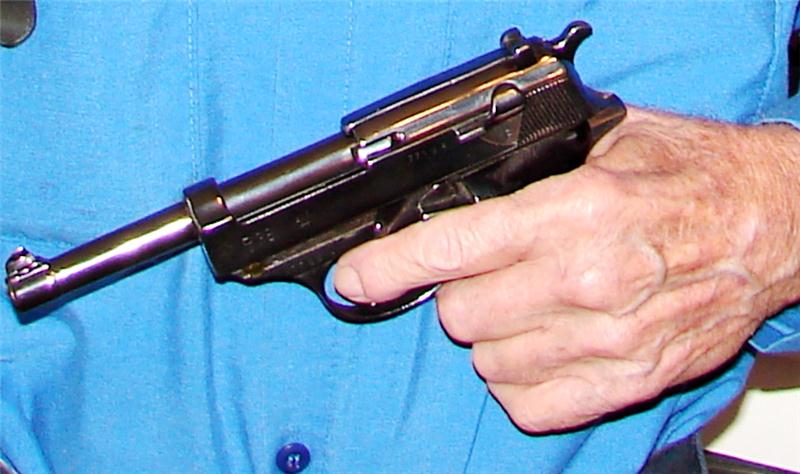
The pistol Bill took from a German soldier.
photo by Jen Jeffrey
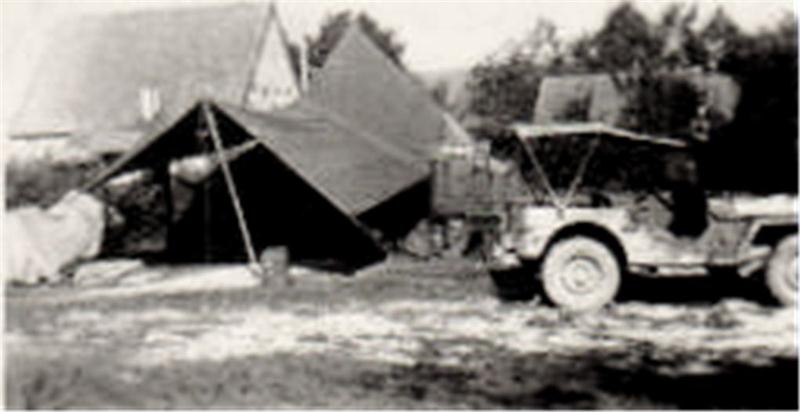
'There were tents everywhere,' Bill says of his landing in Omaha Beach three days after D-Day.
Born in Sale Creek in January of 1924, former Sgt. 1st class, Bill Gothard remembers dodging artillery and shrapnel in the wake of World War II.
Bill’s father, George, was in the timber business and he had two coal mines. His mother, Beulah, cared for Bill and his younger brother and sisters. Bill had a paper route and delivered papers with his bicycle.
“I didn’t give a hoot about sports. Mr. McEwin wanted me to go out for basketball, but when I ran, my side started cramping. He said to keep my butt out of the gym,” Bill recalls.
He instead went around with his father a great deal because he worked dangerous jobs and Bill wanted to be there in case something might happen. “I helped him with timber and then with hauling coal just before I went into the Army,” Bill says.
George Gothard had a close call while working timber and hoisting the pine logs to take to Chattanooga to the preservation company. “He was loading a log on the mountain and rolled it up an incline. It slid off the skids and the end came up and caught him right on the chin. It didn’t break a bone, but he had a scar for the rest of his life,” Bill states.
Having a close call was something Bill would learn too well after he was drafted. “I went in the Army when I was 19 and never thought I would live to see 21,” he says.
A senior in high school, the draft board came to Bill’s school in Sale Creek. Bill could have gotten an extension but he said that Mrs. Bond was trying to get a school play together, so he decided to go ahead and go.
He headed to Fort Oglethorpe and was put on a train to Fort Knox, Ky., at a Replacement Training Center.
Bill had an above average test score on his ACT and was given a choice to go to OCS or to be sent to college for basic engineering. Bill chose the latter and was sent to Concord, Ohio, for eight months. Muskingum College was getting crowded so they transferred Bill to Purdue in Lafayette, Ind.
“There was an article in the Chicago paper saying that the Army was going to close the school down, so I signed up for the Air Force,” Bill states.
The Air Force sent Bill to Miami Beach but the problem was that he only had winter clothes. “It was hot! After two weeks of taking tests after tests, I landed up in the psychiatrist office and they asked if I had a girlfriend,” Bill remembers.
“I said, ‘Well, you might call her a girlfriend. She is about 16 and up in Ohio - nothing serious,’ he asked me a few more questions about it and then he put a big red X on the paper. I didn’t know what it meant,” Bill says.
He wanted to be a pilot or a crewman but when he was sent down to the classification office, they looked at his paper and told him with no explanation that he couldn’t be a pilot.
“He wanted to put me through gunnery school in England. When you are in the bottom of a cupola and, even if you didn’t get shot, if the wheels didn’t come down you were a goner. I told him I was not interested in that. So, he said I could go back in the Army Ground Forces,” Bill says. And that is what he did.
Bill was trained on a Sherman tank as a driver. His MOS was 2936 but his main MOS was 014 – a mechanic.
“They sent me and another man to Camp Kilmer, N.J., to get on the boat Aquitania. It was an English boat and we were on it on D-Day. We went to Scotland on a train. We were guarding the place for about a week and went on a ship to Omaha Beach. There were tents all over the place. I had nine Jeeps that I was responsible for and three armored cars,” Bill states.
In his office at home, Bill has an array of awards which adorn the walls, along with mounted medals in shadow boxes. To the left is a large rectangular map on display. Bill demonstrates the path his division traveled in 1944. (See Video).
“I was in what is known as a ‘ripple dipple’ - that is short for ‘replacement depo’. When someone asked for help they sent us to replace another soldier for what they needed,” Bill states.
He was placed in Charlie troop, in the 4th Armory Division of the 25th Calvary Recon Squadron. Under orders of Lieutenant General George S. Patton, the group moved eastward towards the Saar.
“I was sent on a half-track to pick him up in Nancy, France. Another fellow and I brought a half track into the Saar Valley and the guy I was going to replace was going to take us to the front. There was artillery on the road we were coming in on and the driver stopped and said, ‘We’ll wait right here until that barrage lifts’ because the Germans were trying to hit the artillery which was right ahead of us. We stopped and when the artillery slowed down, I went up on top of the hill and introduced myself to the captain,” Bill says.
“We were at a barn. We were discussing things and the shells started coming over our heads and down where the artillery was that we had just passed.
This fella that went with me, we jumped in a ditch there. The captain said, ‘Soldiers don’t worry about it, they can’t hit us. They have to go above us to get back to that artillery and that is who they want to hit’,” Bill relays.
“That was a relief for a little bit. Then he had the 1st Sgt. tell us where to go and what to do. The man I replaced had dug a foxhole in the barn lot and put boards across it and covered it with dirt. I got his foxhole and didn’t even have to dig one. It was fairly quiet except for the shells going over head,” Bill says.
He described a scene in which he needed to ‘relieve himself’ behind the barn. “I just about ‘finished my business’ and there was a shell that hit about 150 feet in front of me. I pretty well finished,” Bill laughs.
The shell hit the ground and ricocheted about 50 feet from where Bill was standing. “It was lying there sizzling. We were having big tank battles on the back side of the hill. I figured it was just an armor piercing shell because they don’t explode. They just burn on through. I waited a while and went over there, it was the first scare I had,” he expresses.
At 88 years old Bill says his memory isn’t very sharp anymore but he recalls a few unforgettable events as though they were yesterday.
In another incident, enemy artillery fired a round which had landed in the middle of the trailer hitched to the back of the half-track that Bill and his buddy Robert Bittner, were in. The half-track was filled with radiators, tools and spare parts, while the trailer they were towing was full of ammunition and had begun smoking and burning.
“I went out to unhook the pinal while Bittner got in there with a shovel and started shoveling the stuff out of the back of the half-track that was burning. I got in the half-track to move it up and, before I got it stopped, something exploded and his face was black,” Bill evokes.
“We had about a foot of snow and he put his hands on the side of the half-track and barreled over the side and fell in the snow. A guy came up there with a Jeep and loaded him up and took him to the medics. I got pulled away from it,” Bill maintains.
He never suffered any injuries while he served in the Army – just close calls.
“The closest call I was in was when we were at an intersection. If you stayed there very long you got artillery in there – which we did, and I found a foxhole. The Germans had foxholes because of our planes. It was a little bit too small for me and my feet were sticking out at the end. A piece of shrapnel hit my shoe and cut the shoelace off of my shoe! I’m just glad my head wasn’t on that end,” Bill smiles with relief.
The veteran relates, "When crossing the Rhine River, we got a report of two German officers in the clinic. We got in our Jeep, took our rifles and went up there. We went in the front door. They must have been Catholic because there were nuns and they looked surprised. We went all the way to the back and in the last room were two German officers in the bed. The nuns were scared to death. They thought we were gonna shoot the SOBs in the bed, I guess,” Bill says. “I asked the officers, ‘Heistu pistole?’ and they said, ‘Nicht, nicht’,” Bill conveys.
He and his buddy searched the room and found P-38 pistols and confiscated them.
“We got the pistols and just left the Germans there in the bed – we ‘disarmed them’ you might say,” Bill laughs. “Things were winding down a little then.”
Bill has the German soldier's pistol to this day. "I had three guns but I could only bring one home with me,” Bill says.
Fighting all the way to Czechoslovakia and even though the war was now over, Bill didn’t have enough points to come home.
“I stayed for five months and came home May of 1945. I just got out of the hospital for bursitis. I couldn’t work with my shoulder that way so in 90 days I went right back in the Army and they sent me back to the 25th constabulary – we were like the police,” Bill says.
“I had a run-in with a major down there. I wanted to buy a Jeep and I had to get his permission to park it inside the camp. He refused, saying I was squandering my money. I nearly flew off the handle. I didn’t have much more time in the Army and when I got out of his office, I went into the inspector general’s office and told him about the argument. I needed to get out of there or he would have made life miserable for me,” Bill contends.
He said, according to the inspector general, the major was about out of there anyway. It was said that he had many reports against him already.
In 1946, a staff sergeant introduced Bill to a woman named Elfie. “She was a lady. I went to her mother’s house and met her – she spoke better English than I did! She talked a little bit of limey English,” Bill says.
Elfie was throwing a birthday party for the supply sergeant’s girlfriend and she asked Bill what he wanted to drink.
“I just asked for water – most everyone drank beer. The water was not good to begin with. She nearly fainted.” Bill laughs, “She had set the water down and I reached for it with my left hand – I am left handed and back then left-handed people had a bad rep. I thought I blew it.”
Bill and Elfie got married just before he left the Army.
“It was a mess trying to go through paperwork to get her over here. After Regensburg, they transferred me from headquarters to Vienna, Austria, to run the motor pool,” Bill says.
About that time, Bill had sent his father $350 to buy a lot on Dayton Pike in Sale Creek. When Bill and his wife came back home, Exxon put in gas pumps and Bill had himself a service station which later grew to be an auto parts store.
Bill and Elfie had one son, Mike, who was a nuclear engineer with TVA and is now retired.
Elfie passed away in 2009. “My wife and I never had an argument all these years,” Bill says.
About two years ago, the colonel at Sale Creek’s ROTC class asked Bill to come and give his narrative of the war. Bill was still very busy with his store.
“I sold the business and he hunted me up again so I went and talked to them,” Bill says.
Retiring at 88 years of age, Bill has no plans to do anything that would bring on any more close calls or even to travel. “I don’t want to go anywhere …I want to stay right here.”
jen@jenjeffrey.com